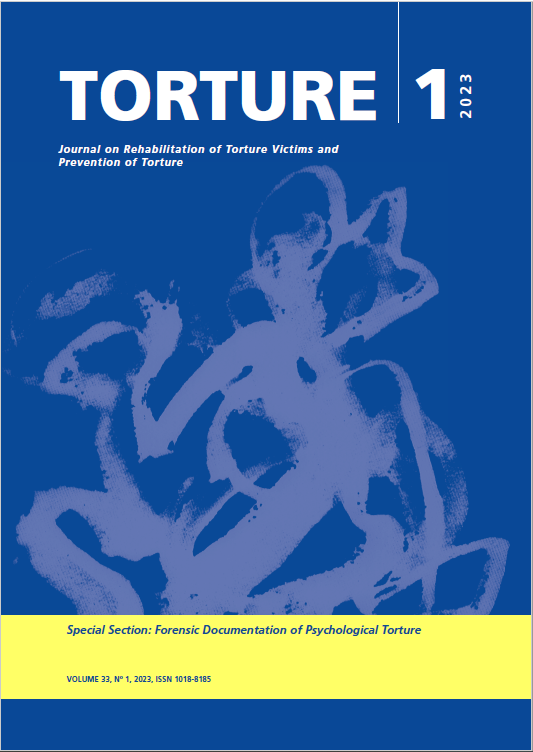Remote evaluations for humanitarian parole of asylum seekers to the United States - The case of MA
English
DOI:
https://doi.org/10.7146/torture.v33i1.134905Keywords:
humanitarian parole, remote evaluationsAbstract
This case seeks to demonstrate the value of remote evaluations conducted by health professionals for the purpose of applying for humanitarian parole. In this case, a survivor of labor trafficking, kidnapping, and sexual violence in her home country endures additional physical and psychological suffering after experiencing physical and sexual assaults while awaiting entry into the United States to seek asylum. As increasing numbers of migrants seeking protection arrive at the United States’ southern border, immigration enforcement deterrence policies keep many asylum seekers in limbo. Remote evaluations conducted by health professionals to document physical and psychological disorders for the purpose of applying for humanitarian parole can help to prioritize the most vulnerable cases (Mishori et al, 2021).
References
Bayne, M., Sokoloff, L., Rinehart, R., Epie, A., Hirt, L., Katz, C. (2019). Assessing the efficacy and experience of in-person versus telephonic psychiatric evaluations for asylum seekers in the U.S. Psychiatry Res. 282:112612.
Blagbrough, J. (2008). “Child Domestic Labour: A Modern Form of Slavery.” Children & Society 22: 179-190.
Mishori, R., Hampton, K., Habbach, H., Raker, E., Niyogi, A., Murphey, D. (2021). "Better than having no evaluation done": a pilot project to conduct remote asylum evaluations for clients in a migrant encampment in Mexico. BMC Health Serv Res. 26;21(1):508.
Neusner, J., Kizuka, K. (2022). The Nightmare Continues: Title 42 Court Order Prolongs Human Rights Abuses, Extends Disorder at U.S. Borders. Human Rights First. Retrieved from https://humanrightsfirst.org/wp-content/uploads/2022/09/NightmareContinues.pdf
Pogue, M., Raker, E., Hampton, K., Saint Laurent, M.L., Mishori, R. (2021). Conducting remote medical asylum evaluations in the United States during COVID-19: Clinicians' perspectives on acceptability, challenges and opportunities. J Forensic Leg Med. 84:102255.
Raker, E., Niyogi, A. (2022). Performing Remote Asylum Evaluations. In K. C. MacKenzie. Asylum Medicine: A Clinician’s Guide. New York: Springer Cham.
Tertsakian, Carina. “A Guide for the SOS-Torture Network on Investigating and Documenting Torture Remotely.” OMCT SOS-Torture Network, 2018, https://www.omct.org/site-resources/legacy/Guide-OMCT-Print_FINAL.pdf.

Downloads
Published
How to Cite
Issue
Section
License
Copyright (c) 2023 Torture Journal

This work is licensed under a Creative Commons Attribution-NonCommercial-NoDerivatives 4.0 International License.
We accept that some authors (e.g. government employees in some countries) are unable to transfer copyright. The Creative Commons Licence Attribution-NonCommercial-NoDerivatives 4.0 International (CC BY-NC-ND 4.0) covers both the Torture Journal and the IRCT web site. The publisher will not put any limitation on the personal freedom of the author to use material contained in the paper in other works which may be published, provided that acknowledgement is made to the original place of publication.

